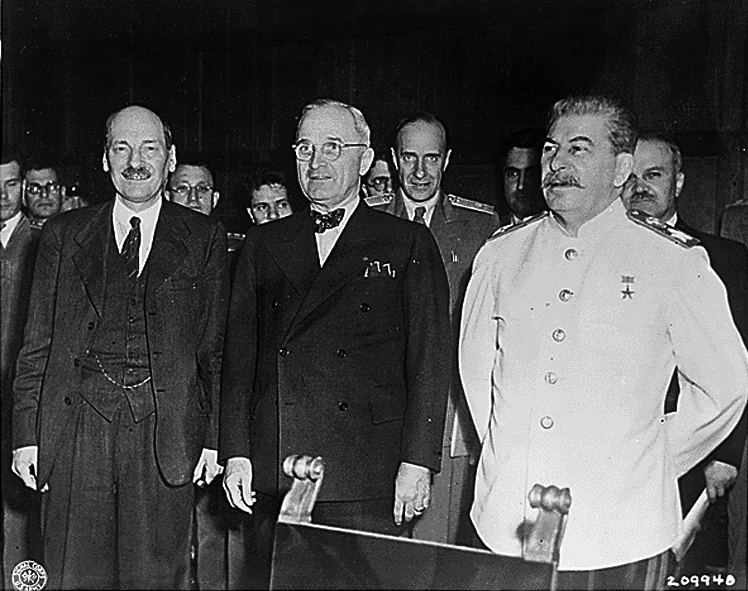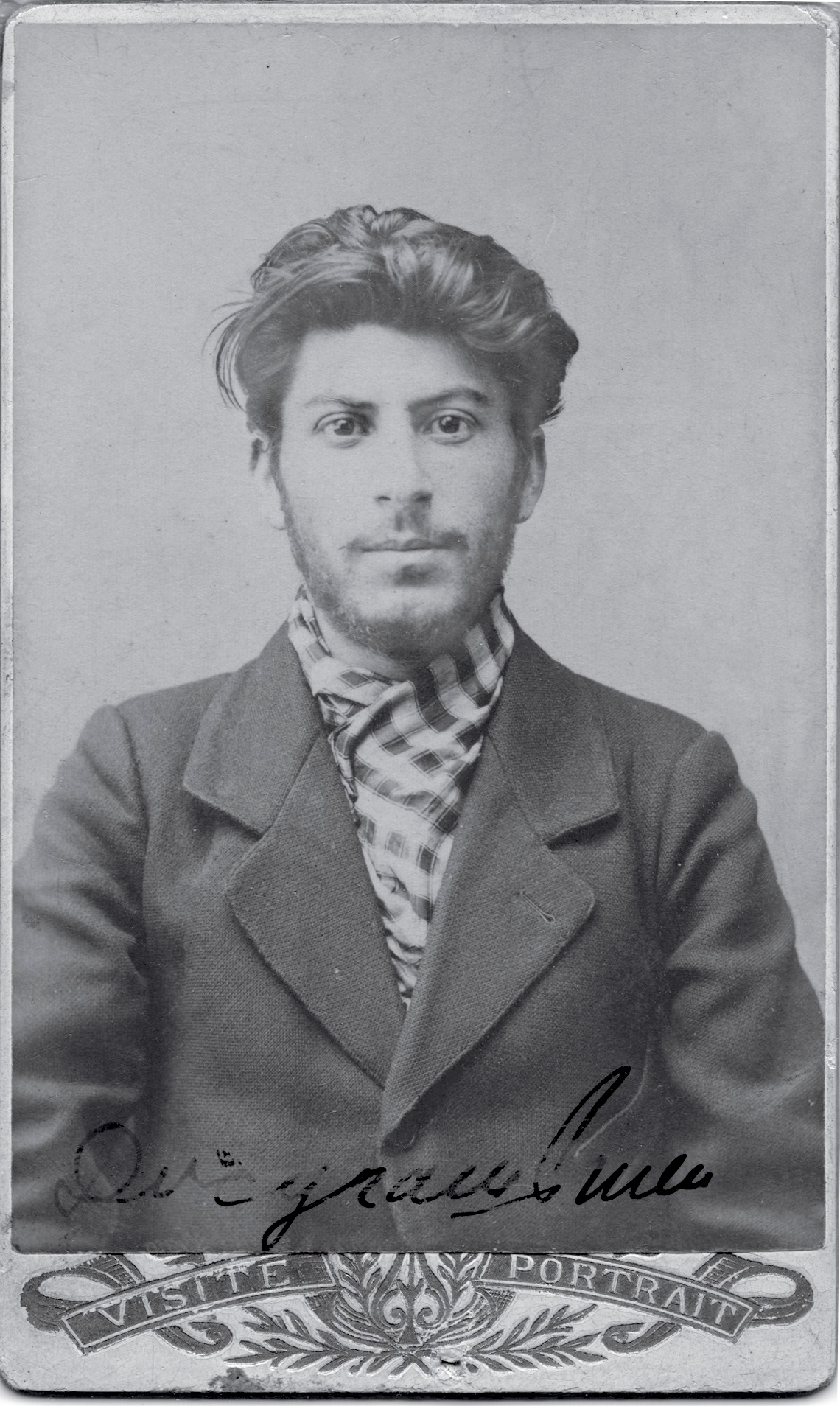|
Treaty Of Potsdam
The Potsdam Agreement (german: Potsdamer Abkommen) was the agreement between three of the Allies of World War II: the United Kingdom, the United States, and the Soviet Union on 1 August 1945. A product of the Potsdam Conference, it concerned the military occupation and reconstruction of Germany, its border, and the entire European Theatre of War territory. It also addressed Germany's demilitarisation, reparations, the prosecution of war criminals and the mass expulsion of ethnic Germans from various parts of Europe. Executed as a communiqué, the agreement was not a peace treaty according to international law, although it created accomplished facts. It was superseded by the Treaty on the Final Settlement with Respect to Germany signed on 12 September 1990. As De Gaulle had not been invited to the Conference, the French resisted implementing the Potsdam Agreements within their occupation zone. In particular, the French refused to resettle any expelled Germans from the east. ... [...More Info...] [...Related Items...] OR: [Wikipedia] [Google] [Baidu] |
Potsdam Big Three
Potsdam () is the capital and, with around 183,000 inhabitants, largest city of the German state of Brandenburg. It is part of the Berlin/Brandenburg Metropolitan Region. Potsdam sits on the River Havel, a tributary of the Elbe, downstream of Berlin, and lies embedded in a hilly morainic landscape dotted with many lakes, around 20 of which are located within Potsdam's city limits. It lies some southwest of Berlin's city centre. The name of the city and of many of its boroughs are of Slavic origin. Potsdam was a residence of the Prussian kings and the German Kaiser until 1918. Its planning embodied ideas of the Age of Enlightenment: through a careful balance of architecture and landscape, Potsdam was intended as "a picturesque, pastoral dream" which would remind its residents of their relationship with nature and reason. The city, which is over 1000 years old, is widely known for its palaces, its lakes, and its overall historical and cultural significance. Landmarks include ... [...More Info...] [...Related Items...] OR: [Wikipedia] [Google] [Baidu] |
End Of World War II In Europe
The final battle of the European Theatre of World War II continued after the definitive overall surrender of Nazi Germany to the Allies, signed by Field marshal Wilhelm Keitel on 8 May 1945 in Karlshorst, Berlin. After German dictator Adolf Hitler's suicide and handing over of power to German Admiral Karl Dönitz in May of 1945, the Soviet troops conquered Berlin and accepted German surrender led by Dönitz. The last battles were fought as part of the Eastern Front which ended in the total surrender of all of Nazi Germany’s remaining armed forces and the German surrender officially ended World War II in Europe, such as in the Courland Pocket from Army Group North in the Baltics lasting until 10 May 1945 and in Czechoslovakia during the Prague offensive on 11 May 1945. Final events before the end of the war in Europe Red Army soldiers from the 322nd Rifle Division liberated Auschwitz concentration camp on 27 January 1945 at 15:00. Two hundred and thirty-one Red Army ... [...More Info...] [...Related Items...] OR: [Wikipedia] [Google] [Baidu] |
Joseph Stalin
Joseph Vissarionovich Stalin (born Ioseb Besarionis dze Jughashvili; – 5 March 1953) was a Georgian revolutionary and Soviet political leader who led the Soviet Union from 1924 until his death in 1953. He held power as General Secretary of the Communist Party of the Soviet Union (1922–1952) and Chairman of the Council of Ministers of the Soviet Union (1941–1953). Initially governing the country as part of a collective leadership, he consolidated power to become a dictator by the 1930s. Ideologically adhering to the Leninist interpretation of Marxism, he formalised these ideas as Marxism–Leninism, while his own policies are called Stalinism. Born to a poor family in Gori in the Russian Empire (now Georgia), Stalin attended the Tbilisi Spiritual Seminary before joining the Marxist Russian Social Democratic Labour Party. He edited the party's newspaper, ''Pravda'', and raised funds for Vladimir Lenin's Bolshevik faction via robberies, kidnappings and protection ... [...More Info...] [...Related Items...] OR: [Wikipedia] [Google] [Baidu] |
Potsdam
Potsdam () is the capital and, with around 183,000 inhabitants, largest city of the German state of Brandenburg. It is part of the Berlin/Brandenburg Metropolitan Region. Potsdam sits on the River Havel, a tributary of the Elbe, downstream of Berlin, and lies embedded in a hilly morainic landscape dotted with many lakes, around 20 of which are located within Potsdam's city limits. It lies some southwest of Berlin's city centre. The name of the city and of many of its boroughs are of Slavic origin. Potsdam was a residence of the Prussian kings and the German Kaiser until 1918. Its planning embodied ideas of the Age of Enlightenment: through a careful balance of architecture and landscape, Potsdam was intended as "a picturesque, pastoral dream" which would remind its residents of their relationship with nature and reason. The city, which is over 1000 years old, is widely known for its palaces, its lakes, and its overall historical and cultural significance. Landmarks include ... [...More Info...] [...Related Items...] OR: [Wikipedia] [Google] [Baidu] |
Cecilienhof
Cecilienhof Palace (german: Schloss Cecilienhof) is a palace in Potsdam, Brandenburg, Germany, built from 1914 to 1917 in the layout of an English Tudor manor house. Cecilienhof was the last palace built by the House of Hohenzollern that ruled the Kingdom of Prussia and the German Empire until the end of World War I. It is famous for having been the location of the Potsdam Conference in 1945, in which the leaders of the Soviet Union, the United Kingdom and the United States made important decisions affecting the shape of post World War II Europe and Asia. Cecilienhof has been part of the Palaces and Parks of Potsdam and Berlin UNESCO World Heritage Site since 1990. Location Cecilienhof is located in the northern part of the large '' Neuer Garten'' park, close to the shore of the ''Jungfernsee'' lake. The park was laid out from 1787 at the behest of King Frederick William II of Prussia, modelled on the Wörlitz Park in Anhalt-Dessau. Frederick William II also had the Marmorpala ... [...More Info...] [...Related Items...] OR: [Wikipedia] [Google] [Baidu] |
Bonn
The federal city of Bonn ( lat, Bonna) is a city on the banks of the Rhine in the German state of North Rhine-Westphalia, with a population of over 300,000. About south-southeast of Cologne, Bonn is in the southernmost part of the Rhine-Ruhr region, Germany's largest metropolitan area, with over 11 million inhabitants. It is a university city and the birthplace of Ludwig van Beethoven. Founded in the 1st century BC as a Roman settlement in the province Germania Inferior, Bonn is one of Germany's oldest cities. It was the capital city of the Electorate of Cologne from 1597 to 1794, and residence of the Archbishops and Prince-electors of Cologne. From 1949 to 1990, Bonn was the capital of West Germany, and Germany's present constitution, the Basic Law, was declared in the city in 1949. The era when Bonn served as the capital of West Germany is referred to by historians as the Bonn Republic. From 1990 to 1999, Bonn served as the seat of government – but no longer capital – ... [...More Info...] [...Related Items...] OR: [Wikipedia] [Google] [Baidu] |
East Prussia
East Prussia ; german: Ostpreißen, label=Low Prussian; pl, Prusy Wschodnie; lt, Rytų Prūsija was a province of the Kingdom of Prussia from 1773 to 1829 and again from 1878 (with the Kingdom itself being part of the German Empire from 1871); following World War I it formed part of the Weimar Republic's Free State of Prussia, until 1945. Its capital city was Königsberg (present-day Kaliningrad). East Prussia was the main part of the region of Prussia along the southeastern Baltic Coast. The bulk of the ancestral lands of the Baltic Old Prussians were enclosed within East Prussia. During the 13th century, the native Prussians were conquered by the crusading Teutonic Knights. After the conquest the indigenous Balts were gradually converted to Christianity. Because of Germanization and colonisation over the following centuries, Germans became the dominant ethnic group, while Masurians and Lithuanians formed minorities. From the 13th century, East Prussia was part of the mon ... [...More Info...] [...Related Items...] OR: [Wikipedia] [Google] [Baidu] |
Pomerania
Pomerania ( pl, Pomorze; german: Pommern; Kashubian: ''Pòmòrskô''; sv, Pommern) is a historical region on the southern shore of the Baltic Sea in Central Europe, split between Poland and Germany. The western part of Pomerania belongs to the German states of Mecklenburg-Western Pomerania and Brandenburg, while the eastern part belongs to the West Pomeranian, Pomeranian and Kuyavian-Pomeranian voivodeships of Poland. Its historical border in the west is the Mecklenburg-Western Pomeranian border '' Urstromtal'' which now constitutes the border between the Mecklenburgian and Pomeranian part of Mecklenburg-Western Pomerania, while it is bounded by the Vistula River in the east. The easternmost part of Pomerania is alternatively known as Pomerelia, consisting of four sub-regions: Kashubia inhabited by ethnic Kashubians, Kociewie, Tuchola Forest and Chełmno Land. Pomerania has a relatively low population density, with its largest cities being Gdańsk and Szczecin. Ou ... [...More Info...] [...Related Items...] OR: [Wikipedia] [Google] [Baidu] |
Stalin
Joseph Vissarionovich Stalin (born Ioseb Besarionis dze Jughashvili; – 5 March 1953) was a Georgian revolutionary and Soviet political leader who led the Soviet Union from 1924 until his death in 1953. He held power as General Secretary of the Communist Party of the Soviet Union (1922–1952) and Chairman of the Council of Ministers of the Soviet Union (1941–1953). Initially governing the country as part of a collective leadership, he consolidated power to become a dictator by the 1930s. Ideologically adhering to the Leninist interpretation of Marxism, he formalised these ideas as Marxism–Leninism, while his own policies are called Stalinism. Born to a poor family in Gori in the Russian Empire (now Georgia), Stalin attended the Tbilisi Spiritual Seminary before joining the Marxist Russian Social Democratic Labour Party. He edited the party's newspaper, ''Pravda'', and raised funds for Vladimir Lenin's Bolshevik faction via robberies, kidnappings and protection rac ... [...More Info...] [...Related Items...] OR: [Wikipedia] [Google] [Baidu] |
Berlin Declaration (1945)
The Berlin Declaration (german: Berliner Erklärung/Deklaration) of 5 June 1945 or the Declaration regarding the defeat of Germany,Officially, the "Declaration regarding the defeat of Germany and the assumption of supreme authority with respect to Germany by the Governments of the United States of America, the Union of Soviet Socialist Republics, the United Kingdom and the Provisional Government of the French Republic". had the governments of the United States, the Soviet Union, the United Kingdom, and France, acting on behalf of the Allies of World War II, jointly assume de jure "supreme authority" over Germany after its military defeat and asserted the legitimacy of their joint determination of issues regarding its administration and boundaries prior to the forthcoming Potsdam Conference. Background The German Instrument of Surrender of 8 May 1945 had provided only for the military capitulation of German armed forces, the German signatories being representatives of the German H ... [...More Info...] [...Related Items...] OR: [Wikipedia] [Google] [Baidu] |


_-_page_3.jpg)


